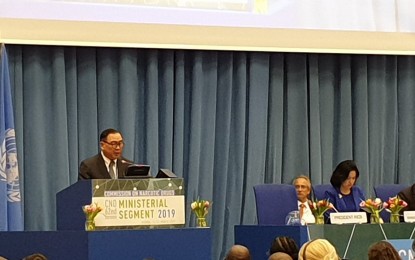
Department of Foreign Affairs Secretary Teodoro Locsin Jr. at the Ministerial Segment of the 62nd Session of the Commission on Narcotics and Drugs in Vienna, Austria. (Photo courtesy of the Philippine Embassy in Vienna)
MANILA -- The Philippines' campaign against illegal drugs is a renewal of the government's commitment to protect law-abiding citizens against the lawless, Foreign Affairs Secretary Teodoro Locsin Jr. said before the United Nations on Thursday.
For several years, the National Anti-Drug Plan of Action has been in place in the Philippines and the Duterte administration "just gave it a sharper edge, a longer blade, and a wider swing", Locsin said.
"Ours is a whole of nation approach – we throw everything at the drug trade but firmly anchored on UN drug conventions, the 2009 Political Declaration and Plan of Action, the 2016 UNGASS (UN General Assembly Special Session) Outcome, the ASEAN (Association of Southeast Asian Nations) Work Plan against Illicit Drugs, and our national development plan, which has no place above ground for the drug trade," he said in a speech delivered at the Ministerial Segment of the 62nd Session of the Commission on Narcotics and Drugs in Vienna, Austria.
Locsin said the government continues to implement a multi-pronged strategy to counter illegal drugs through "enforcement, rehabilitation, and reintegration."
"It must be so. Our enemies command vast resources and many allies; including a section of international opinion. The Chinese, African and Mexican-Sinaloa Drug Cartels, and now the Colombian cartel operate in our country," he said.
The foreign affairs chief noted that flooding a country with drugs is "a highly successful form of asymmetric warfare," the same way drug money has also enabled the taking of Marawi City by the Islamic State.
He said the Philippines has more than a hundred million population and faces the South China Sea and has a spitting distance to major shabu manufacturers in Asia.
Since 2016, the government has conducted a total of 128,000 policy operations, arrested 200,600 drug dealers, and filed 139,400 cases in court. In the process, at least 331 police personnel were killed and wounded.
The government was also able to freeze USD106-million worth of illegal drug assets and seized USD499-million worth of drugs and lab equipment, including 3,400 kg. of shabu.
"There have been shocking abuses; not many but one is too much. They were not collateral damage inflicted on innocents to get at the enemy; but morally repulsive cases of reckless disregard for basic rights and fundamental decencies by rogue cops," he said. (PNA)
